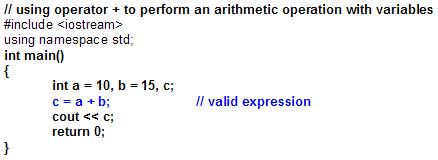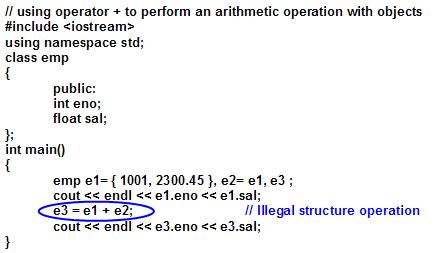Learning C/C++ Step-By-Step - Page 15
15. Step-by-Step C/C++ --- C++ Programming - Operator Overloading
Operator Overloading
| 1. Introduction 2. Operator • Rules of Operator Overloading • Restrictions on Operator Overloading 3. Overloading Unary Operators 4. Overloading Binary Operators 5. Operator Overloading with Strings |
1. Introduction
// Assign a variable to another |
// Assign an object to another |
Expressions are common in every language; an expression is a collection of operands and operators. Where as an operation is a collection of expressions.
The above two programs demonstrate how variables/objects were assigned together.
Both programs are valid, they demonstrates the use of equalto ( = ) operator.
 |
 |
Operator overloading is one of the most exciting feature of object-oriented programming. It is used to overcome the situation like the above illegal structure operation. It can transform complex, obscure program listing into intuitively obvious ones.
Through Operator overloading we can see how the normal C++ operators can be given new meanings when applied to user-defined data types. The keyword operator is used to overload an operator, and the resulting operator will adopt the meaning supplied by the programmer.
For example using object we can perform direct string assignment operation.
// Program to assign a string to other |
2. Operator
type operator operator-symbol ( parameter-list )
The operator keyword declares a function specifying what operator-symbol means when applied to instances of a class. This gives the operator more than one meaning, or "overloads" it. The compiler distinguishes between the different meanings of an operator by examining the types of its operands.
Rules of Operator Overloading
- You can overload the following operators:
| + | - | * | / | % | ^ | |
| ! | = | < | > | += | –= | |
| ^= | &= | |= | << | >> | <<= | |
| <= | >= | && | || | ++ | –– | |
| ( ) | [ ] | new | delete | & | | | |
| ~ | *= | /= | %= | >>= | == | |
| != | , | –> | –>* |
- If an operator can be used as either a unary or a binary operator, you can overload each use separately.
- You can overload an operator using either a non-static member function or a global function that's a friend of a class. A global function must have at least one parameter that is of class type or a reference to class type.
- If a unary operator is overloaded using a member function, it takes no arguments. If it is overloaded using a global function, it takes one argument.
If a binary operator is overloaded using a member function, it takes one argument. If it is overloaded using a global function, it takes two arguments.
Restrictions on Operator Overloading
- You cannot define new operators, such as **.
- You cannot change the precedence or grouping of an operator, nor can you change the numbers of operands it accepts.
- You cannot redefine the meaning of an operator when applied to built-in data types.
- Overloaded operators cannot take default arguments.
- You cannot overload any preprocessor symbol, nor can you overload the following operators:
. |
.* |
:: |
?: |
The assignment operator has some additional restrictions. It can be overloaded only as a non-static member function, not as a friend function. It is the only operator that cannot be inherited; a derived class cannot use a base class's assignment operator.
3. Overloading Unary Operators
Let’s start off by overloading a unary operator. Unary operators act on only one operand. ( An operand is simply a variable acted on by an operator). Examples of unary operators are the increment and decrement operators ++ and --, and the unary minus.
Example:
The following example demonstrates the use of increment operator ++.
#include <iostream> |
One more example to overloading unary minus.
#include <iostream> |
4. Overloading Binary Operators
But operators can be overloaded just as easily as unary operators. We will look at examples that overload arithmetic operators, comparison operators, and arithmetic assignment operators.
We have just seen how to overload a unary operator. The same mechanism can be used to overload a binary operator.
// Overloading + operator |
5. Operator Overloading with Strings
C/C++ deals with strings quite differently; we never copy, concatenate, or compare strings using operators like other languages. C/C++ has built functions to perform the above operations. But C++ provides the facility to do every thing on strings using operators. That means we have to provide extra responsibility to operators to perform such things.
The following example demonstrates the comparison between two strings using comparison operator ==.
// Program to compare two strings using operator overloading |
// concatenation of two strings |
Ref: Object-oriented Programming in Turbo C++: Robert Lafore

